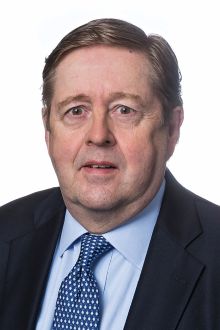Interview by Cecily Garber

Net Assets: You were a professor at Vanderbilt University’s Owen Graduate School of Management before launching The American Graduate School of Management, an online college, in the late 1990s. Why — and how — did you start an online university?
Richard Oliver: At Vanderbilt, I participated in a university-wide study about where technology in education might be going. After doing my part, looking into infrastructure issues and fiber optic cables, I approached the chancellor about this thing percolating called online education. I saw that for-profit schools were doing it and thought we should investigate. Because the march of a university can be slow, we set up a new institution offering an MBA connected to but separate from Vanderbilt. Our first office was on campus and our first investment came from the university.
I’d been a vice president for a big tech company and a business professor at two major universities, Vanderbilt and Cornell, so I thought I knew something about business. But I knew nothing about how to set up an academic institution. Faculty members are oblivious to a whole range of things that are difficult to learn about, like getting accredited and funded, hiring faculty and developing courses all at once. To be frank, the transition was no layup. It was excruciatingly difficult. I think that’s why other schools faltered, because it was immensely complicated.
Net Assets: What has helped you survive the tumultuous world of online education?
Oliver: We’ve been unafraid of taking a risk and changing. We started as a business school, but I had worked with Vanderbilt’s nursing school because my wife earned a degree there, and I knew the dean, who was an innovative person. I thought we’d try to get into the nursing education business too.
Then we moved the university to Denver from Nashville because we had been the only online program in Tennessee, and I couldn’t find anyone there who complemented my knowledge base to help me run the organization. Denver was a center of online education.
After setting up a separate nursing school, we decided we wanted to get into tech education too. Rather than starting from scratch, we thought we’d try to find a program with a built-out curriculum. So we bought the American College for Computer and Information Sciences and enhanced its technology. In 2006 we combined the three institutions — business, nursing and computer science — into one online university.
Over time we’ve figured out what we’re really good at — graduate education and professional school — and what we’re not as good at, and focused on the former. We’ve moved away from being a full-service university with undergraduate and associate programs and are now much more a professionally focused university. Our one remaining bachelor’s degree is in nursing. Today it’s about 50-50 graduate students and undergrads. We expect over the next few years to reach a 70–30 ratio, with just the nursing bachelor’s. We’ve also homed in on healthcare. Our original MBA program was suitable for people in any industry, but now it’s tailored to healthcare management.
So transition is in our blood. We attract employees that are innovative, open and willing to try new things. We’ve tried a lot of things that didn’t work as well.
Net Assets: What changes are next for American Sentinel?
Oliver: We’re moving from online education, which still involves lots of paper and traditional processes, to digital education, which is more fully automated.
On the administrative side, we still accept checks for tuition, we employ a registrar, we have all the standard procedures for servicing students. Stacks of student files are paper-based. But we’ve begun to convert paper- and human-based systems to digital systems that empower students to do things on their own.
For example, if students wanted to ask for an extension or drop a course in the old system, they’d need to ask the professor for permission. The process might take five days. Typically the answer is yes. So why not automate the process and let students do it themselves? Automation allows students to focus on their academic work and not fret about the administrative end. We’ve relieved the faculty and registrar of this headache, too. We have checks and balances; if a student has asked for an extension three times, we’ll slow down the process and look more closely at the situation. But generally we trust the students. From a new student dashboard, students can pay tuition, understand where they are in their degree, or go to class. It’s a portal to all interactions at the university.
Student advisors are available during the regular workday, 8 to 5, but we also have a product called MAURA, My Anytime University Resource Aide, which is a virtual intelligent agent that is available 24/7 and can answer 500 questions in about 6,000 different ways. We’ve been using it for three years now with 99 percent accuracy. We have a strong idea of what students will ask. The major use of the service is at night and on weekends. If we want to offer 24/7 service, we save by using MAURA.
We started digitizing administrative procedures because that was easy for people to understand. But you can’t put people in a 21st-century administrative environment and then flip them into a 19th-century academic environment — that defeats your purpose. So on the academic side, we’ve built a simulated world called Sentinel World for our bachelor’s in nursing. Soon we will eliminate courses altogether, and students will operate entirely in Sentinel World, where they interact with virtual patients, respond to hospital disaster scenarios, work with health care policy makers and the like. The program tracks students’ keystrokes, and faculty members receive a report.
Today 30 nursing schools are using Sentinel World, educating about 13,000 nurses. We’re also selling the MAURA service to other institutions.
Net Assets: Does the change from online to digital education lead to cost savings?
Oliver: These changes are not driven by cost but rather the student experience. Digital education requires the same amount if not more input from the
faculty because students get so immersed and engaged that they want more and more discussion. The job of the faculty member is changing, from sage on the stage to coach on the side and curator of information.
That said, there are enormous cost pressures on higher education these days because of competition. I hear the independent school world faces pressure too. And the cost of doing things digitally is coming down in many ways. Software and PCs, for example, are a fraction of what they used to be. And digital workflows are getting cheaper, faster and more elegant. We’re investing $2 million on our digital transformation, but expect that investment to drive down administrative operating costs as well as dramatically shift learning.
Net Assets: You have a 96 percent student satisfaction rate. With so much change, how do you know what works?
Richard Oliver
American Sentinel University
Oliver: For one, we constantly survey students, ask them what they like and don’t like. We see what they’re asking student success advisors and MAURA. And we ask faculty and staff for regular feedback. American Sentinel is all about the user experience, and faculty and staff are users too. We look at every single aspect of the institution and ask, Is there a better way to do this?
We also ask students what they like in the digital realm beyond their education and what services they use. Basically what we’ve found is that they like Facebook, Amazon, YouTube, Microsoft, Google, not necessarily in that order. They like online banking. Our students are extremely knowledgeable about the digital world. So the test for us should be, Can our students get services from us as easily as they get them from the larger digital world they appreciate?
And for every project, we develop a set of evaluation tools and estimate the payback period. Before we even begin a project, we look for ROI and cost of capital, and then judge that against the pain points, the real problems for faculty, students and employees.
Net Assets: How might what you’ve learned in the higher education market apply to the preK–12 independent school market?
Oliver: Obviously there are differences between the two worlds, but I notice many striking similarities. I used to think that whatever happens in higher ed filters down over time into the preK–12 realm, but after eight years with One Schoolhouse, I have found that higher ed has much to learn from preK–12 approaches. For example, I’ve come to understand the importance of personalized pedagogy, and American Sentinel now offers much more choice in student assignments. Students can demonstrate their knowledge by completing a project or writing paper or taking a test — whatever opportunities are available digitally.
American Sentinel’s contribution, I hope, is that we’ve eased the administrative and services burden on faculty, staff and students using all the tools at our disposal. At the end of the day, regardless of students’ age and family income, we all are conditioned by the digital world we live in and develop expectations about how services should be provided. There is a tremendous amount of pressure to offer superior services for the same price or less. That’s true in higher ed, and I think it’s true in the independent school market too.




